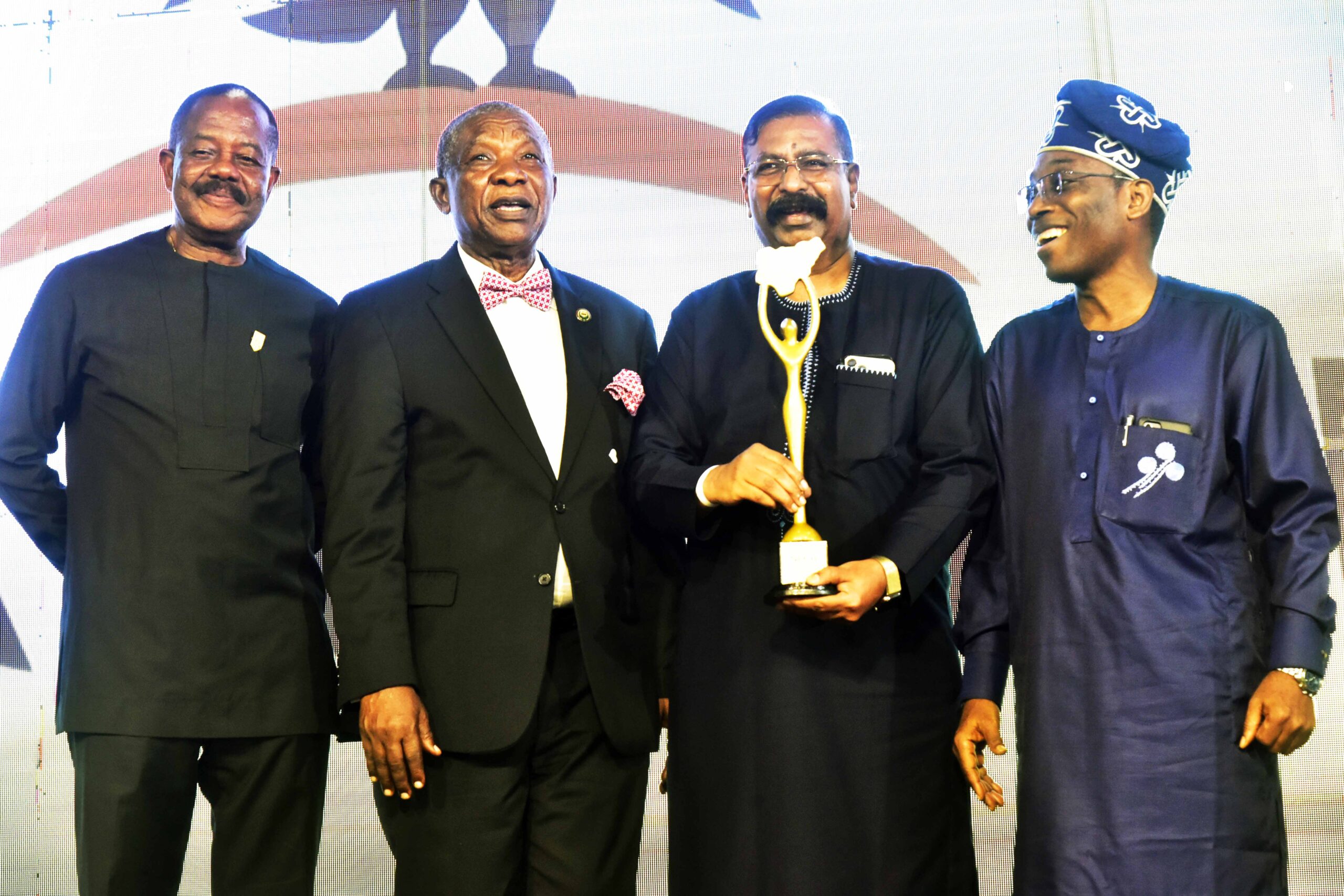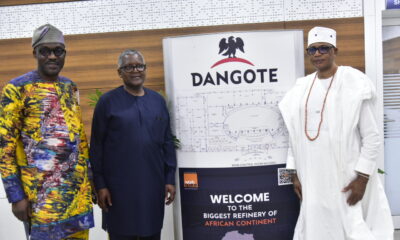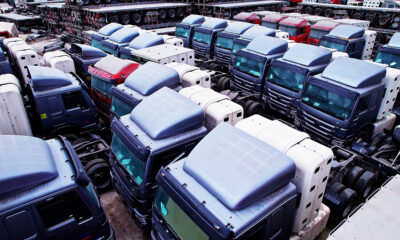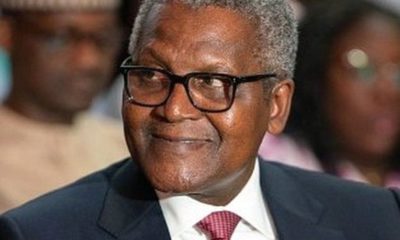Business
How Dangote Cement Tackles Africa’s Waste, Climate Change Issues
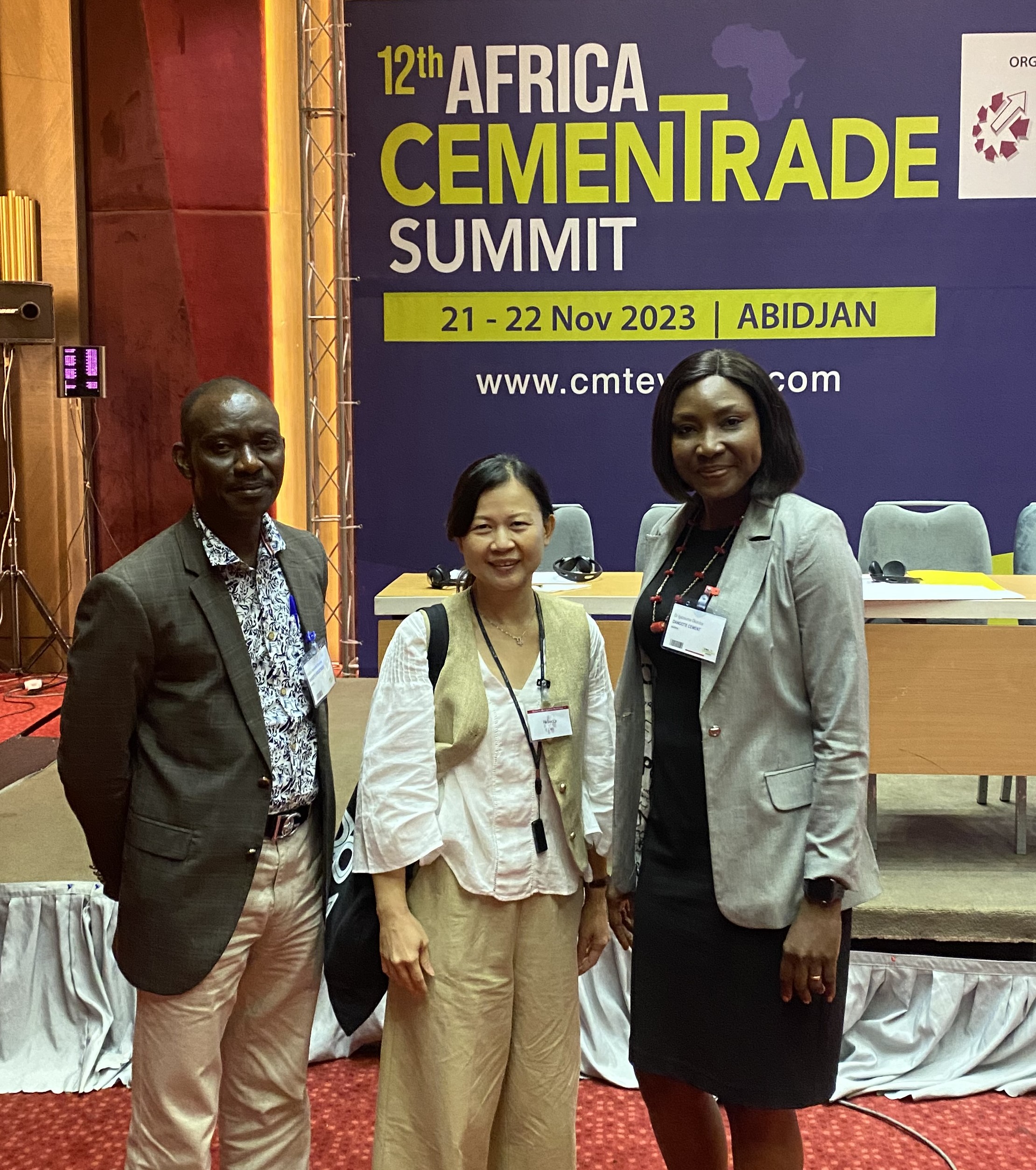
. . . Africa Cement Trade Summit Opens In Abidjan
The Group Managing Director of Dangote Cement Plc, Arvind Pathak has opened up to industry players on how the company is at the forefront to save the environment through sustainable production of cement with the utilisation of Alternative Fuels (AF).
He made the disclosure at the 12th Africa Cement Trade Summit (ACTS), which kicked off in Abidjan, Cote d’Ivoire.
According to Pathak, cement production is an energy-intensive process which consumes thermal energy of about 3.3GJ/tonne of clinker produced, and its electrical energy consumption is in the region of about 90 – 120kWh/tonne of cement.
He maintained that decarbonisation was no longer an option but a necessity, with the use of alternative fuels, such as municipal, agricultural, and industrial wastes, in the place of fossil fuels, which have been effective in emissions reduction.
Pathak was delivering a paper titled “Utilisation of Alternative Fuels as a Strategy for Sustainable Cement production in Africa” at the Summit organised by the Singapore-based Center for Management.
The summit had in attendance cement companies’ Chief Executives, Cement Industry Service Providers and other critical sector stakeholders from across the world.
According to the Dangote Cement CE, who was represented by the Group’s Head of Sustainability, Dr. Igazeuma Okoroba, AF as opposed to fossil fuels emit less CO2 when combusted and that agricultural biomass are known to be carbon neutral.
He noted that with the level of cement consumption worldwide reaching 4.2 billion tonnes in 2020 and as population is projected to grow by 12‑23% in 2050 due to rapid urbanisation, the demand for cement will also grow, therefore the need to prioritise the inclusion of alternative fuels in fuel mix is crucial to address climate change concerns.
He said the cement industry, which provides a vital material to meet Africa’s infrastructure deficit, generates 7% of the world’s CO2 emissions as the cement value chain involves the intensive use of energy for raw materials’ mining, crushing, mixing, drying, firing, clinker grinding, packaging and dispatch to customers.
This, he posited, places a critical demand on fuel sourcing and controlled energy usage, as almost every stage of the cement value chain produces CO2 emissions, with the bulk of emissions emanating from the firing process during clinker production in the kiln.
“From being the world’s largest bulk cement importers to self-sufficiency and now net exporters of cement to other countries, it is therefore not unexpected that Dangote Cement is one of the pioneer African companies in decreasing CO2 emissions through a fuel substitution strategy. Through reporting, Dangote Cement responds to the evolving environmental, and social challenges by disclosing investment priorities and progress on projects that address the issues.
“We also leverage sustainability reporting to ignite market growth. As part of this commitment, we began reporting in 2020 and received an initial rating of C on climate change. As the company’s actions improved, we rose to a B- and then achieved a B+ rating in 2022,” Pathak added.
According to him, “As a multinational present in many African countries, Dangote Group aims to become a regional leader in sustainability. Dangote Cement is dedicated to environmental sustainability and combating climate change. We have implemented a robust Climate Change Policy that aligns our operations with global climate goals. The Environmental Pillars of the company define the ways of entrenching sustainability by identifying, measuring and mitigating actual and potential environmental impacts of operations.”
Pathak revealed that the company’s goal is to continuously improve performance on energy efficiency, waste management, water consumption, and monitoring of greenhouse gas emissions. “As an African business, we believe that utilising alternative fuel is a critical decarbonisation lever for industries to address the continent’s climate change mitigation. Dangote Cement’s Alternative Fuel (AF) Project is an example of this mindset,” he said.
The Dangote Cement boss told his audience that in the wake of global climate shocks, decarbonisation is no longer an option but a necessary component to future-proof businesses in a rapidly changing world. He added that businesses must set clear and detailed short, medium, and long-term targets and decarbonisation strategies for each transition target.
“Indications are that companies that are likely to thrive in this new wave of climate consciousness are not only decarbonising but also thinking about how to shift the business into faster-growing areas.
“Our Board maintains oversight over sustainability reporting, which is essential for corporate success. Through this reporting, Dangote Cement responds to evolving environmental and social challenges by disclosing sustainability commitments and actions. As part of this commitment, we began reporting to the CDP in 2020 and received an initial rating of C on climate change. As the company’s actions improved, we rose to a B- and then achieved a B+ rating in 2022.
“We are one of the pioneer African companies in decreasing CO2 emissions through a fuel substitution strategy. This initiative focuses on substituting fossil fuels by using alternative fuels. The consequences of this strategy are already visible. Biomass and alternative fuels are said to have a lower environmental impact compared to conventional fuels but may produce some emissions.
“Dangote Cement’s efforts in providing access to adequate, safe, and affordable housing are consolidated in the Dangote seven sustainability pillars, themed “The Dangote Way”. Through the drive of the leadership on sustainability, we have a compelling challenge for deliberate programmes for the substitution of fossil fuels, with AF. This also contributes to Nigeria’s CO2 reduction commitments by 2060″, he added.
While admitting that the emissions challenge will tarry in the industry for a while, Pathak expressed optimism that the cement industry will continue to contribute to tackling climate change, besides the consequential benefit of CO2 emission abatement.
He noted that as urbanisation contributes to increase waste generated, Sub-Saharan Africa is predicted to become the prevalent region globally in terms of total waste generation, if the current trend persists. Low-income countries have also been at the receiving end of hazardous wastes from waste trades, which further compounded the waste situation.
“The Stockholm Convention on Persistent Organic Pollutants (POPs) which is a global treaty to protect human health and the environment from highly dangerous chemicals, describes the firing hazardous waste in cement kilns as the best available technique for treating dangerous waste because most cement kilns possess the conditions and equipment to treat hazardous waste. This is where Dangote Cement provides the solution to Africa’s waste problem”, he asserted.
“Beyond the management of Africa’s waste, AF is a lever to decarbonise cement manufacturing process. Regarding cost and policies in Africa, other options are improving the energy mix with increased use of transitional fuels, efficiency in cement production, design optimisation, and decarbonisation via CO2 sinks, such as reforestation and renewable energy for power generation,” he concluded.
Business
Savannah Energy Provides Unaudited FY 2024 Trading Updates

Savannah Energy has shared a trading update on its Nigerian operations and other markets in Africa, including up-to-date cash collections in its Nigerian business.
According to the update, made available on Thursday in Lagos, its gross production in Nigeria averaged 23.1 Kboepd for FY 2024, broadly in line with the prior year’s 23.6 Kboepd, of which 88% was gas (FY 2023: 91%).
On the update, CEO of Savannah Energy, Andrew Knott, said, “I am pleased to provide a FY trading update which demonstrates the continued progress we have made in 2024, a year which saw the highest level of cash collections ever recorded by our Nigerian business. 2025 is expected to be an exciting year for our Company: we have a large planned operational programme in Nigeria which is anticipated to enhance both our oil and gas production levels and capacity; we intend to progress our R3 East oil development project in Niger; we continue to pursue key acquisitions in the upstream oil and gas space; and we continue to seek to build our power business.
“Fundamentally, Savannah remains unequivocally an “AND” company, seeking to deliver strong performance both for the short AND long term across multiple fronts, and pursuing growth opportunities in both the hydrocarbon AND power sectors.”
The update It also shows that it generated a Total Income of US$393.6 million in 2024, compared to FY 2023’s US$289.8 million. This consists of Total Revenues of US$258.7 million and Other operating income of US$134.9 million.
The report also shows that Savannah’s FY 2024 Total Revenues were ahead of the previously issued financial guidance of greater than US$245 million, while FY 2024 financial guidance is reiterated for Operating expenses plus administrative expenses at ‘up to US$75 million’. The company expects its FY 2024 capital expenditure to come in lower than planned (previously guided at ‘up to US$50 million’) due to the phasing of spend.
ALSO READ: CSR: Dangote Awards Scholarships To 473 Students
According to the update, Savannah’s cash collections in 2024 amounted to US$248.5 million, a slight increase from the US$206 million it received in 2023. The report further shows that its cash balances as at 31 December 2024 stood at US$32.6 million, compared to the 31 December 2023 figure of US$107.0 million.
The report shows that the company’s midstream subsidiary, Accugas Limited, had as at 31 December 2024 drawn down on its NGN332 billion of the NGN Transitional Facility, with the resulting funds being converted to US$, which, along with cash held, was used to partially prepay the existing Accugas US$ Facility, leaving a balance as at 31 December 2024 of approximately US$212.3 million.
The report also provided new updates on Accugas’ US$45 million Uquo Central Processing Facility (“Uquo CPF”) compression project in Nigeria, noting that its commissioning which will enable the expansion of gas production in the medium term is well underway.
The report highlighted the progress being made in the procurement process of long lead equipment in Nigeria for a potential two-well drilling campaign on the Uquo Field in H2 2025, with an additional gas development well expected to add up to 80 MMscfpd of supplemental production capacity and a potential exploration well targeting an Unrisked Gross gas initially in place (“GIIP”) of 154 Bscf (25.7 MMboe) of incremental gas resources.
The update shows that progress is also being made in the planned Savannah acquisition of Sinopec International Petroleum Exploration and Production Company Nigeria Limited, whose principal asset is a 49% non-operated interest in the Stubb Creek oil and gas field (“Stubb Creek”), with regulatory approval and completion being targeted in Q1 2025. Following the completion of the acquisition, Savannah intends to commence an expansion programme which is anticipated to increase Stubb Creek gross production from an average of 2.7 Kbopd in 2024 to approximately 4.7 Kbopd.
In Niger, Savannah continues to seek to progress its 35 MMstb (Gross 2C Resources) R3 East oil development in South-East Niger, while it continues to push for a potential alternative transaction structure to acquire a material stake in producing oil and gas assets in South Sudan as previously announced on 20 December 2024.
On the renewable energy front, the update shows that Savannah has up to 696 MW of renewable energy projects currently in motion, including the up to 250 MW Parc Eolien de la Tarka wind farm project in Niger and the up to 95 MW Bini a Warak hybrid hydroelectric and solar project in Cameroon. A firm believer in Africa’s transition to renewable energy, Savannah continues to target a portfolio of up to 2 GW+ of power projects in motion by the end of 2026.
Business
Nigeria Can Achieve 5.5% GDP Growth – NESG
The Nigerian Economic Summit Group (NESG) has projected that the country has the potential to achieve a 5.5% growth in Gross Domestic Product (GDP) if critical policy reforms are sustained.
This was disclosed on Thursday during the launch of the NESG’s 2025 Macroeconomic Outlook report.
Speaking at the event, the Chief Economist and Director of Research & Development at NESG, Dr. Olusegun Omisakin, highlighted the need for more efficient policy implementation to unlock Nigeria’s economic potential.
READ MORE: Davido Is Richer Than His Billionaire Father – Ibrahim Chatta Claims
“We believe at the optimal level, if we embark on more efficient policy reforms, the Nigerian economy has the potential, the GDP to end up at 5.5 per cent, and we believe that this is achievable,” Omisakin stated.
More to follow……….
Business
CBN Approves Release Of Nigerian FX Code
The Central Bank of Nigeria (CBN) has announced the release of the Nigerian Foreign Exchange (FX) Code, a set of guidelines designed to promote ethical conduct among authorized dealers in the country’s FX market.
In a statement, the apex bank disclosed that the official launch of the Code would take place on Tuesday, January 28, 2025, at the CBN Head Office Auditorium in Abuja.
READ MORE: Dangote Denies Culpability In Pumping Up Petrol Price
“The Central Bank of Nigeria has approved the release of the Nigerian Foreign Exchange (FX) Code as a guideline to the banking industry to promote the ethical conduct of authorised dealers in the Nigerian Foreign Exchange Market,” the statement read.
The introduction of the FX Code is expected to enhance transparency, accountability, and professionalism within Nigeria’s foreign exchange ecosystem, aligning it with global best practices.
The event is anticipated to attract key stakeholders in the financial and banking sectors, as well as representatives from authorized FX-dealing institutions across the country.

